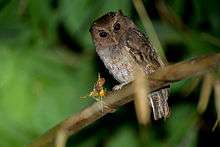Rufescent screech owl
The rufescent screech owl (Megascops ingens) is a species of owl in the family Strigidae. It is found in Bolivia, Colombia, Ecuador, Peru, and Venezuela. This is one of the larger species of screech owls, similar in size to the white-throated screech owl. The overall length is 25 to 29 centimetres (9.8 to 11.4 in) and weight in males is 134–190 grams (4.7–6.7 oz) and 140–273 grams (4.9–9.6 oz) in females. Its coloration is sandy-brown above, vermiculated darker, the facial disc is sandy-brown, without a distinct rim. The flight feathers are barred cinnamon and dusky and the tail is cinnamon with darker brown bars. The hindcrown has buffy-whitish border. It has honey-brown eyes and small ear-tufts. The tarsi are feathered to the base of the toes. The Colombian screech owl was formerly considered a distinct species, but is now considered conspecific.
| Rufescent screech owl | |
|---|---|
 | |
| Scientific classification | |
| Kingdom: | Animalia |
| Phylum: | Chordata |
| Class: | Aves |
| Order: | Strigiformes |
| Family: | Strigidae |
| Genus: | Megascops |
| Species: | M. ingens |
| Binomial name | |
| Megascops ingens (Salvin, 1897) | |
| Synonyms | |
|
Otus ingens (Salvin, 1897) | |
Its natural habitat is subtropical or tropical moist montane forests, from elevations of 1,200 to 2,500 metres (3,900 to 8,200 ft).This relatively powerful bird is a strictly nocturnal bird that becomes active at dusk. During the daytime it mostly roosts among epiphytes on thick branches. Little is known about the life history of this bird. Larger insects and spiders are taken, as well as small vertebrates. The reproductive biology of this owl merits further study, but it will typically nest in a natural hole in a tree where it lays pure white eggs directly on the bottom of the cavity.
The rufescent screech owl is classified as least concern by the IUCN.
References
- BirdLife International (2012). "Megascops ingens". IUCN Red List of Threatened Species. 2012. Retrieved 26 November 2013.CS1 maint: ref=harv (link)
- "Owls: A Guide to the Owls of the World" by Claus Konig, Friedhelm Welck & Jan-Hendrik Becking. Yale University Press (1999), ISBN 978-0-300-07920-3.
